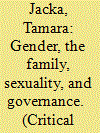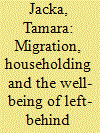| Srl | Item |
| 1 |
ID:
061089


|
|
|
| 2 |
ID:
096413


|
|
|
| 3 |
ID:
111298


|
|
|
| 4 |
ID:
141901


|
|
|
|
|
| Summary/Abstract |
Recent feminist debate about how to achieve the substantive representation of women in government has been conducted largely in relation to national parliaments in democratic states. This article brings a new perspective by examining grassroots rural government in contemporary China – an authoritarian state, which, however, began implementing village “self-government,” including elections, in 1987. The article draws on qualitative fieldwork in the Chinese provinces of Zhejiang and Yunnan. The authors went into this fieldwork with an understanding that women's substantive representation, democracy, and gender equality are mutually constituted and with an expectation that village self-government might make a much-needed contribution to the achievement of all three. However, we ran into trouble with this analytical framework. First, there were marked variations in villagers’ practices and understandings of “representation.” Second, we found that democracy was not a prerequisite for substantive representation. Third, most villagers we talked with claimed that “men and women are equal” and there was little conception of villagers’ interests diverging by gender. This article explores our analytical “trouble,” with a view to advancing scholarship on constraints to democracy in authoritarian states and suggesting fruitful directions for feminist theorists interested in the relationship between gender, representation and democracy.
|
|
|
|
|
|
|
|
|
|
|
|
|
|
|
|